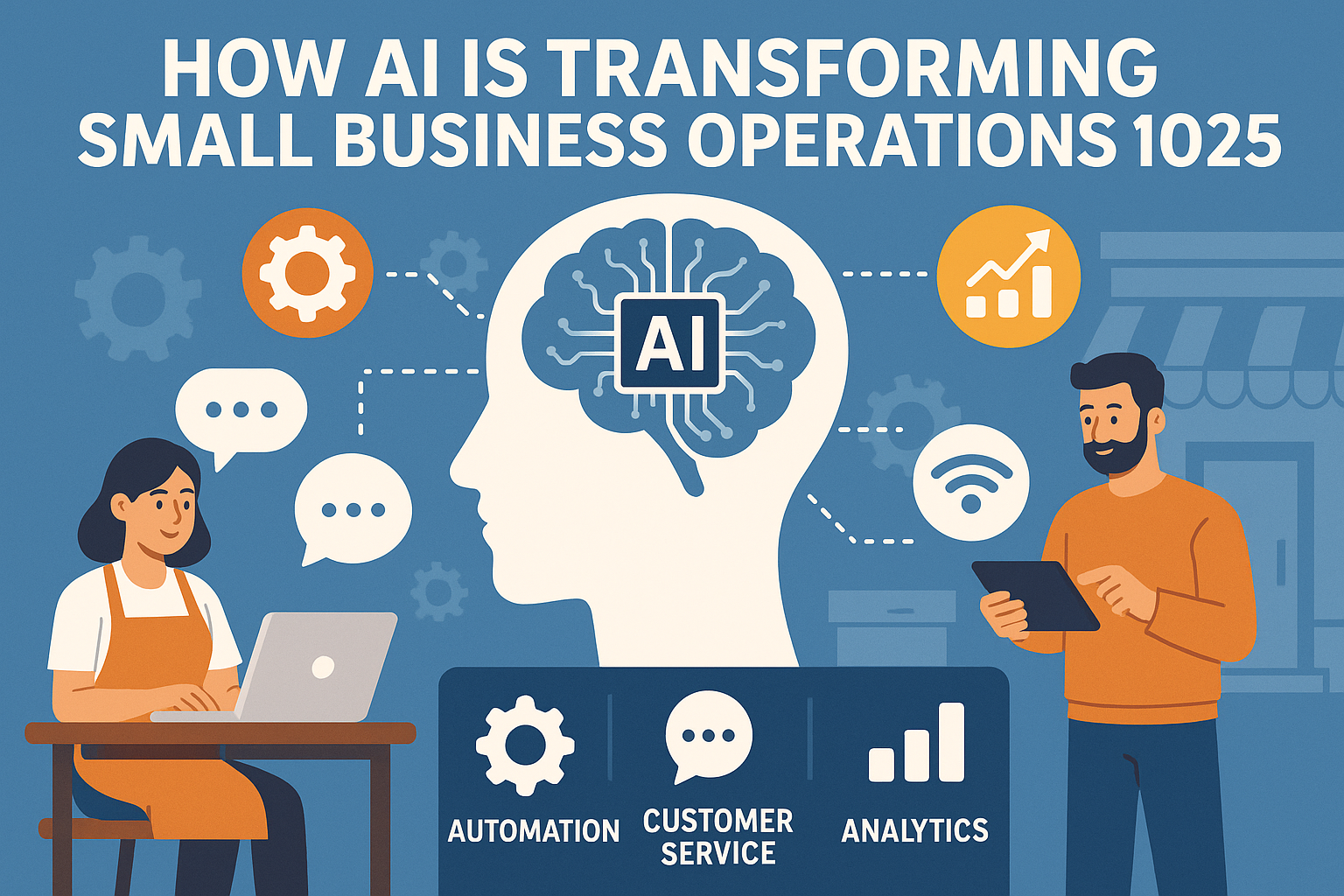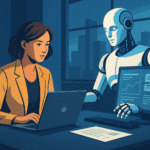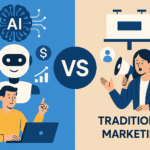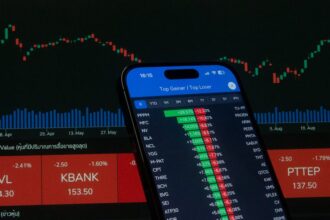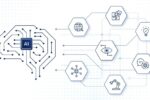How AI Is Transforming Small Business Operations in 2025
Table of Contents
- Introduction
- Why AI Matters for Small Businesses in 2025
- AI in Customer Service
- AI-Powered Marketing & Sales
- AI in Finance & Accounting
- AI in Human Resources
- AI in Supply Chain & Inventory Management
- AI for Decision-Making & Strategy
- Emerging AI Trends in 2025
- Benefits & Challenges
- How to Start Using AI
- Real-World Examples
- FAQ
- Conclusion
Introduction
In 2025, artificial intelligence (AI) has become a defining force in reshaping how small businesses operate. What was once a luxury reserved for large enterprises with big budgets is now accessible, affordable, and essential for startups, freelancers, and local businesses.
From customer service chatbots to AI-powered marketing automation, small businesses are leveraging AI not only to cut costs but also to compete with industry giants. According to a 2025 report from Deloitte, over 72% of small businesses are already using at least one AI tool to streamline operations, improve efficiency, and scale growth.
In this article, we will explore how AI is transforming small business operations in 2025, the key areas of adoption, real-world examples, and how entrepreneurs can prepare for the next wave of AI innovation.
Why AI Matters for Small Businesses in 2025
1. Democratization of AI Tools
In the past, AI platforms were too complex and expensive for small companies. Now, with SaaS-based solutions like Systeme.io, Jasper AI, Freshdesk, and HubSpot, even solo entrepreneurs can access advanced features such as predictive analytics, customer segmentation, and automated workflows.
2. Competitive Advantage
- Personalize marketing campaigns at scale.
- Automate repetitive back-office tasks.
- Provide 24/7 customer support.
- Make data-driven decisions in real time.
3. Cost Efficiency
According to Gartner (2025), small businesses that integrate AI into daily operations report an average of 28% cost savings within the first year of adoption.
Key Ways AI Is Transforming Small Business Operations in 2025
1. AI in Customer Service
Customer expectations are higher than ever. Small businesses must deliver fast, personalized, and always-on support.
- Chatbots & Virtual Assistants: Tools like Freshdesk AI and Drift enable small businesses to respond instantly to customer queries.
- Multilingual Support: AI-powered systems break language barriers, allowing small businesses to expand internationally without hiring large teams.
- Sentiment Analysis: Platforms like HubSpot Service Hub use AI to detect customer emotions and adjust responses accordingly.
Case Study: A local e-commerce store in Poland integrated an AI chatbot and reduced customer service costs by 40%, while improving response time from hours to seconds.
2. AI-Powered Marketing & Sales
- Content Generation: Tools like Jasper AI help small businesses produce SEO-optimized blog posts, ads, and emails in minutes.
- Personalization: AI analyzes customer behavior to deliver hyper-targeted campaigns, increasing conversion rates by up to 35%.
- Predictive Analytics: AI forecasts demand and customer preferences, enabling small businesses to plan campaigns ahead of time.
- Social Media Automation: Platforms like Buffer + AI suggest the best posting times, hashtags, and captions to maximize engagement.
Statistic: In 2025, 64% of small businesses report higher ROI from AI-driven marketing campaigns compared to traditional approaches.
3. AI in Finance & Accounting
- Expense Tracking: Tools like QuickBooks AI categorize expenses automatically.
- Fraud Detection: AI systems identify unusual transactions instantly.
- Forecasting: Predictive analytics allows small businesses to anticipate revenue and avoid cash shortages.
- Tax Compliance: AI reduces human error in filing, ensuring compliance with local and international regulations.
Example: A Moroccan consultancy used Zoho Books AI to automate invoice generation, reducing accounting hours by 50% per month.
4. AI in Human Resources
- AI Recruitment: Platforms like Workable AI scan CVs and shortlist candidates based on skills, saving HR teams dozens of hours.
- Employee Engagement: AI tools track performance and suggest personalized learning paths.
- Workforce Scheduling: AI predicts staffing needs, ensuring optimal scheduling in industries like retail and hospitality.
Real-world Impact: Restaurants using AI-based workforce scheduling in 2025 report 20% reduction in labor costs and improved staff satisfaction.
5. AI in Supply Chain & Inventory Management
- Demand Forecasting: AI predicts stock needs based on seasonality and consumer trends.
- Automated Reordering: Inventory management tools automatically trigger supplier orders.
- Logistics Optimization: AI reduces delivery times by selecting the best courier and route.
Statistic: Businesses using AI-powered inventory systems report up to 45% reduction in stockouts and overstocking.
6. AI for Decision-Making & Strategy
- Business Intelligence (BI): Tools like Tableau + AI simplify data visualization.
- Competitive Analysis: AI monitors competitors’ pricing, customer feedback, and market positioning.
- Scenario Planning: Entrepreneurs can test “what-if” scenarios before making risky investments.
Example: A small travel agency in Spain used AI to analyze customer trends and shifted focus to eco-tourism packages, leading to a 22% revenue increase in 2025.
Emerging AI Trends for Small Businesses in 2025
- Voice-Activated AI: Customers are increasingly using voice search. Optimizing websites for AI voice assistants like Alexa, Siri, and Google Assistant is now essential.
- AI + Blockchain for Trust: Small businesses are adopting blockchain-integrated AI for secure contracts and transparent supply chains.
- AI-Powered Personalization at Scale: From personalized pricing to custom recommendations, small businesses can now rival Amazon-level personalization.
- Low-Code AI Tools: Entrepreneurs without coding skills can build AI workflows with drag-and-drop platforms.
- Sustainability AI: AI optimizes energy use and reduces waste, helping small businesses meet eco-conscious customer demands.
Benefits & Challenges of AI Adoption
| Benefits | Challenges |
|---|---|
| Cost savings (20–30%) | Initial setup costs |
| Improved customer experience | Training staff on AI tools |
| Data-driven decisions | Data privacy & compliance |
| Competitive edge vs. larger firms | Overreliance on automation |
| Faster workflows & productivity | Resistance to change |
How to Start Using AI in Your Small Business
- Identify Pain Points: Start with the most time-consuming tasks (customer service, accounting, marketing).
- Choose Affordable Tools: Start with freemium versions of AI platforms like Systeme.io or HubSpot Starter.
- Train Your Team: Ensure employees understand how to use AI effectively.
- Monitor ROI: Measure cost savings, time saved, and revenue growth.
- Scale Gradually: Add advanced AI tools as your business grows.
Pro Tip: Focus on AI tools with integrations so they work seamlessly across marketing, sales, and finance.
Real-World Examples of Small Business AI Transformation
- Boutique Retailer: Implemented AI-powered inventory tracking and boosted sales by 18% due to reduced stockouts.
- Freelance Consultant: Used Jasper AI to create content, saving 15 hours weekly and gaining 3 new clients.
- Local Gym: Adopted AI-driven customer engagement software to retain 92% of members in 2025.
FAQ: AI and Small Business Operations in 2025
1. How can small businesses afford AI in 2025?
AI is no longer expensive. Many platforms like Systeme.io, Jasper AI, and Freshdesk offer affordable monthly plans starting from $20. Cloud-based SaaS models allow businesses to pay only for the features they need, making it accessible even for solopreneurs. Additionally, many AI tools provide free trials or limited free plans, allowing small businesses to experiment before committing financially.
2. What is the best AI tool for customer service in 2025?
The best AI tool depends on business size and needs. For startups, Freshdesk AI offers chatbots and ticketing systems at an affordable price. For growing companies, HubSpot Service Hub provides integrated CRM and AI support. Businesses with multilingual clients can benefit from LivePerson AI, which supports over 30 languages.
3. Is AI safe for handling sensitive data in small businesses?
Yes, as long as businesses choose AI platforms compliant with data protection laws like GDPR and CCPA. Leading providers such as Zoho, HubSpot, and Microsoft AI invest heavily in encryption and compliance. Small businesses must also train staff in data security and use secure cloud solutions.
4. Can AI completely replace employees in small businesses?
AI is designed to augment human work, not replace it. While it automates repetitive tasks, human creativity, empathy, and decision-making remain irreplaceable. In fact, businesses that combine AI with human staff often achieve the highest efficiency and customer satisfaction levels.
5. What industries benefit most from AI in 2025?
Virtually all industries benefit, but top adopters in 2025 include:
- E-commerce & Retail (personalized recommendations, inventory).
- Hospitality (AI booking assistants, customer service).
- Consulting & Freelancing (content generation, analytics).
- Healthcare (patient scheduling, diagnostics).
- Finance (fraud detection, forecasting).
Conclusion
The year 2025 marks a turning point in how AI is transforming small business operations. What was once futuristic is now a necessity for survival and growth. From customer service automation to marketing optimization, financial management, and HR, AI empowers small businesses to operate smarter, faster, and more profitably.
For entrepreneurs, the key is starting small, integrating affordable tools, and scaling strategically. By doing so, small businesses can not only compete with larger corporations but also thrive in a rapidly changing marketplace.
